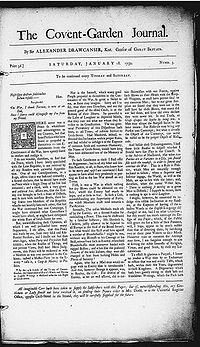
The Covent-Garden Journal (modernised as The Covent Garden Journal) was an English literary periodical published twice a week for most of 1752. It was edited and almost entirely funded by novelist, playwright, and essayist Henry Fielding, under the pseudonym, "Sir Alexander Drawcansir, Knt. Censor of Great Britain". It was Fielding's fourth and final periodical, and one of his last written works.
The Journal incited the "Paper War" of 1752–1753, a conflict among a number of contemporary literary critics and writers, which began after Fielding declared war on the "armies of Grub Street" in the first issue. His proclamation attracted multiple aggressors and instigated a long-lasting debate argued in the pages of their respective publications. Initially waged for the sake of increasing sales, the Paper War ultimately became much larger than Fielding had expected and generated a huge volume of secondary commentary and literature.
Further controversy erupted in June, when Fielding expressed support for a letter decrying the government's 1751 Disorderly Houses Act 1751 (25 Geo. 2. c. 36) in the Journal. His remarks were viewed by the public as an endorsement of the legality of prostitution, and it soon became common opinion that the letter, initially attributed to a "Humphrey Meanwell", was in fact written by Fielding. Fielding refuted this assertion in the 1 August issue of the Journal, while labelling prostitutes a source of social evils.
The final issue of the Journal was released on 25 November 1752. In its last months, poor sales had resulted in a transition from semi-weekly to weekly release. Ill-health and a disinclination to continue led Fielding to end its run after the Number 72 issue. He died two years later while staying in Lisbon, Portugal.